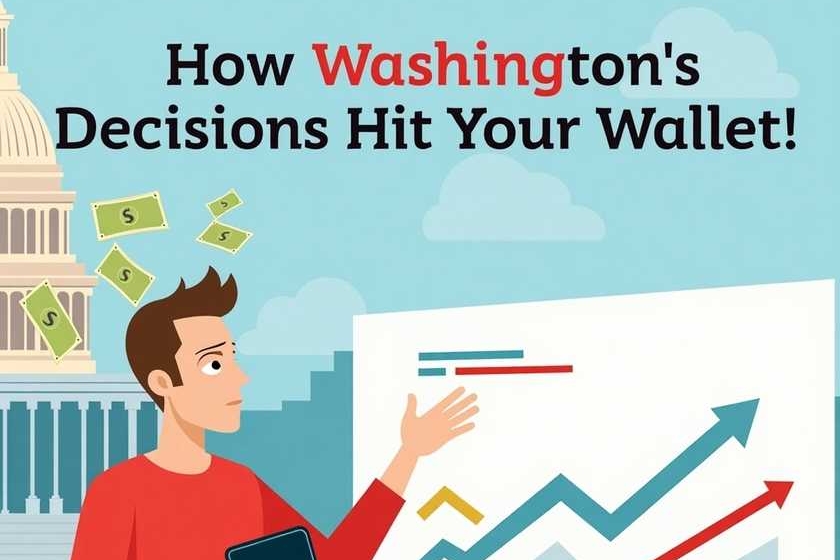From Capitol Hill to your kitchen table, the decisions made in Washington D.C. don’t just shape policy—they directly impact your finances, your business’s bottom line, and your long-term economic future. Whether it’s an interest rate hike, a new tax plan, or sweeping regulatory changes, the ripple effect reaches Main Street America faster than you may think.

🏛️ Government Spending: What It Means for You
When Congress passes massive spending bills—on infrastructure, defense, or social programs—it can be a double-edged sword. On one hand, it may create jobs and inject cash into the economy. On the other, it often increases the federal deficit, which can weaken the dollar and eventually lead to inflation.
Inflation erodes your purchasing power, meaning your paycheck doesn’t stretch as far, and your savings might lose value over time.
💸 Tax Policy: Your Paycheck, Your Business
The IRS isn’t the only player in your tax world—Washington sets the rules. Changes in income tax brackets, capital gains taxes, or small business deductions can leave you either keeping more or less of your hard-earned money.
- For individuals: Shifts in standard deductions and tax credits directly affect your annual return.
- For freelancers and small businesses: Deductions for home offices, health insurance, and business expenses can change from year to year, impacting cash flow and profit margins.
🏦 Federal Reserve Decisions: Interest Rates and Credit
When the Fed raises or cuts interest rates, it’s trying to either cool down or boost the economy. But here’s how it affects you:
- Higher rates = more expensive mortgages, car loans, and credit cards.
- Lower rates = cheaper borrowing but lower yields on savings accounts.
If you’re a small business owner, the cost of borrowing for expansion or inventory is directly tied to these rate decisions.
🌎 Trade Policies and Tariffs: Global Decisions, Local Impact
Remember the recent talk of tariffs on goods from China or the European Union? Those decisions, made in Washington, can cause prices to rise on everyday goods—electronics, food, and clothing—due to increased import costs.
That affects your wallet. And if you run a business that imports products or relies on international suppliers, your entire supply chain might feel the heat.
🧾 Regulation: Red Tape or Protection?
Changes in regulation—whether rolling back environmental laws or tightening rules on big tech and banks—can swing the economy.
For consumers, fewer regulations may lower costs in the short term. But long-term? It could risk safety, privacy, or financial stability.
Businesses, especially startups, need to stay nimble and ready to adapt to regulatory shifts that could increase compliance costs or open up new opportunities.
🔮 So, What Can You Do?
- Stay informed: Follow credible financial news outlets and updates from the Federal Reserve and U.S. Treasury.
- Work with a CPA or financial advisor: Especially during times of policy change, professional guidance is key.
- Diversify your income and savings: Spread your risk—across industries, savings accounts, and investments.
✅ Final Thoughts
Washington may seem distant, but its economic decisions reach into your daily life in very real ways. Whether you’re a college student with a side hustle, a gig worker filing quarterly taxes, or a small business owner planning for growth, staying aware of federal policies can help you plan smarter and stay ahead.
Understanding these connections empowers you to take control of your financial future—even when the headlines feel out of your hands.
